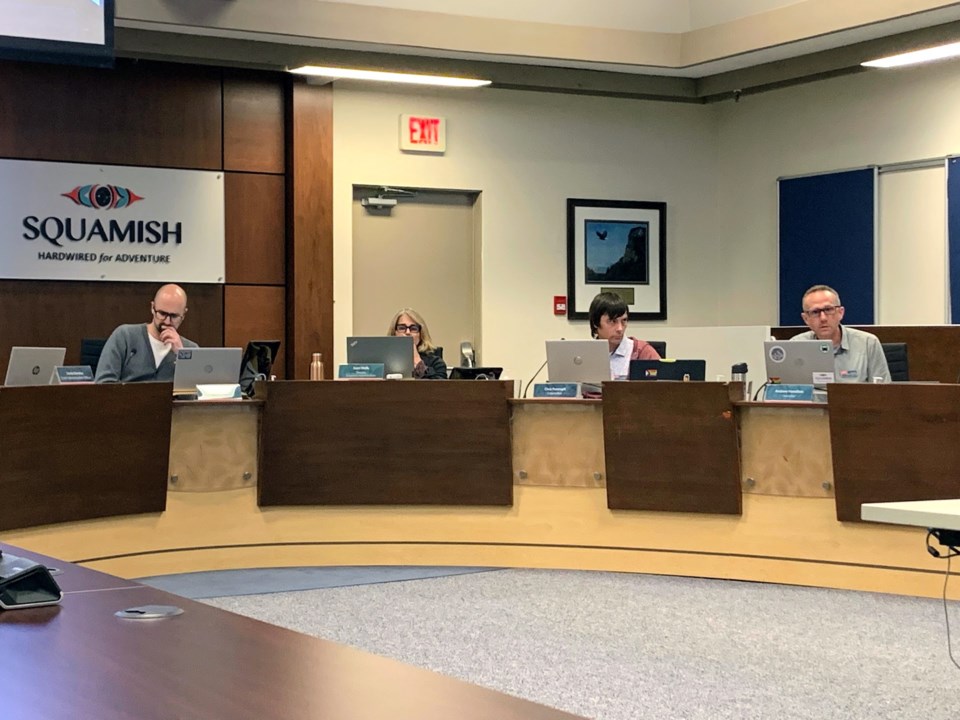The floatel just got a life raft from Squamish council.
At the regular business meeting on May 21, council voted 4-3 to reconsider the temporary use permit (TUP) application for Woodfibre LNG’s floating worker accommodation, the floatel.
The floatel is a refurbished ship that could house about 650 workers and would be moored at the WLNG site about seven kilometres away from downtown Squamish.
Council will reconsider the decision——to approve a one-year TUP with conditions on June 4.
Mayor Armand Hurford and councillors Eric Andersen, John French and Andrew Hamilton voted in favour of the reconsideration whereas councillors Lauren Greenlaw, Chris Pettingill and Jenna Stoner were opposed.
Notably, the TUP may not have any changes for the June 4 reconsideration, although the council may choose to go a different route, such as approving the permit or deferring it back to staff. The council may also ultimately choose to defeat the application again.
About a dozen people were in council chambers holding signs against the project. Several representatives from WLNG were also in attendance, including president Christine Kennedy.
Tracey Saxby, the executive director of My Sea to Sky, was allowed to speak about the issue to the council via a unanimous decision during unscheduled public attendance.
While no one from WLNG spoke at the meeting, WLNG hasn’t just sat quietly since the April 30 motion from Squamish council that defeated the company’s TUP application for the floatel.
WLNG invited regional media to view the floatel as it was moored in Vancouver, sent a couple of letters to council, and published an open letter addressed to council and Squamish residents.
WLNG has also said since the decision that they would offer a $10 million security deposit instead of $2 million. The new number was originally proposed on April 30 by Coun. Hamilton.
While this new information technically cannot be considered by council on June 4—because council is not allowed to consider new information to what is before them in the vote—it did set in motion the May 21 decision to reconsider the TUP.
“A key piece of my decision is our ability to hold the proponent accountable for the promises they make in the TUP,” said Hamilton. “By increasing the amount … we have a lever to hold the proponent accountable.”
There was a litany of concerns noted by those who opposed the reconsideration.
Greenlaw said she looked forward to hearing feedback about the gender-cultural safety plan that was recently made publicly available and the increase in security deposits. However, she still wanted a cumulative impact assessment, cumulative housing impacts, how the company is handling local procurement, and a hazard assessment on the Henrietta Lake dam, which is up the mountain from the WLNG site.
Andersen said his position remained unchanged from April 30 and that he viewed the floatel as the “best solution” and should be “implemented with minimal delay.”
After the vote, there was some discussion about when the reconsideration would take place and how to do so, considering a public hearing had already taken place. Eventually, it was settled to happen on June 4.
WLNG letters urge council reconsideration, but My Sea to Sky says company undermining the process
As stated above, several letters urging reconsideration were sent to the council about the decision, and another open letter was published by the company.
WLNG’s open letter countered that the floatel was a direct response to the District of Squamish asking WLNG to house non-local workers away from the community.
“A councillor suggested that there are better solutions than a floatel. Housing options were considered and discussed with the District over a five-year engagement process, during which the District repeatedly asked the company and regulators to house non-local workers outside the community due to low vacancy rates in Squamish. Woodfibre LNG responded with the floatel. … If council had better ideas, they had five years to bring those forward,” reads the letter.
Meanwhile, a letter to council from the company’s president, which is available to view on the May 21 agenda, alluded to legal action against the District.
“I hope you will recognize the problematic nature of the decision-making to date concerning this
TUP and I sincerely hope that we can avoid any further delay, and any litigation, in this matter,” the letter concludes.
It also admonished council for “the seeming lack of recognition” of S岣祑x瘫wú7mesh Úxwumixw (Squamish Nation) jurisdiction and approval of the project and reiterated some conditions have oversight from the Environmental Assessment Office (EAO) rather than the District.
“The conditions included in the [Environmental Assessment Certificate], including the development of a Gender and Cultural Safety Management Plan, Waste Management Plan, Community Services and Infrastructure Management Plan, Transportation Management Plan, and Air Quality and Noise Monitoring Plans, are subject to EAO and in some cases Squamish Nation oversight and are not the responsibility of the District to approve.”
On the other hand, Saxby said WLNG was trying to “circumvent” and “undermine” the decision-making process from Squamish council.
“Again, this latest request from Woodfibre LNG for council to reconsider its decision to deny the temporary use permit for its proposed floatel is the farthest thing from a demonstration of functional democracy or procedural fairness,” she told council. “No one else is looking out for the best interest of Squamish except for you, our local elected leaders.”
A spokesperson for WLNG wrote an email to The Squamish Chief that the company is "pleased" with council's decision to reconsider.
"The floatel is a direct and effective response to the community’s and council’s concerns and preferences, it’s our hope that council is ready to provide the temporary zoning approval."
Note: This story was updated on May 24 to reflect a comment from WLNG.

